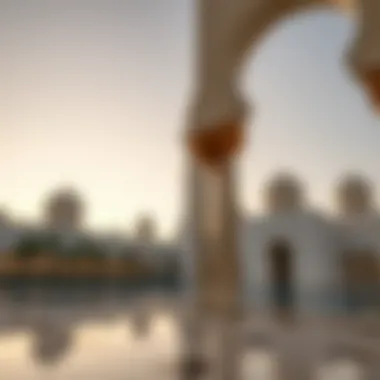Discover Incredible Destinations Near Dubai


Intro
Dubai, often regarded as a bustling metropolis with its eye-catching skyscrapers and opulent lifestyle, serves as a springboard for discovering a plethora of remarkable destinations. Whether you’re a seasoned globetrotter or simply seeking a weekend getaway, the range of options is nothing short of diverse. As you step beyond the city’s glimmering facade, you open the doorway to unique cultures steeped in history, breathtaking landscapes, and experiences that resonate deeply with the fabric of the region.
From local spots that highlight the UAE's heritage to international havens where adventures abound, this guide aims to sift through the myriad of choices available. You'll find detailed insights into each destination, alongside practical travel information to streamline your planning. This blend of information serves the needs of a discerning audience comprising investors, expats, agents, managers, and buyers—all of whom seek enriching experiences anchored in cultural authenticity and historical depth.
To navigate this world of travel easily, knowing the market trends can prove invaluable, particularly for investors or those considering property investments. As such, we’ll delve into how these trends affect travel and exploration. Plus, for those considering making the leap into property investment here or abroad, it will be essential to grasp the types of options available and funding tips that will support wise decisions. The aim is to enhance each excursion, allowing you not just to visit, but to truly experience the richness each location has to offer.
Let’s embark on this exploration of noteworthy destinations that are both captivating and culturally significant.
Preamble to Travel from Dubai
Traveling from Dubai opens a treasure trove of experiences that provide insights into the diverse cultures and landscapes of the region. This city isn’t just a hub of luxury; it also serves as a strategic gateway for those keen on exploring neighboring territories rich in history and nature.
When considering travel from Dubai, one soon realizes that the proximity to a range of destinations is a major draw. Each locale, steeped in its own unique heritage, offers travelers a chance to step outside the fast-paced urban life and immerse themselves in different cultures and traditions. This aspect is fundamentally appealing to various audiences—whether you're an investor scouting for business opportunities or an expat wanting to understand more about the regional nuances. The insights gained from these travels can significantly enrich both personal and professional lives.
Moreover, planning these excursions is made simpler than one might imagine. Dubai’s well-connected transport system, be it by air, land, or sea, ensures that adventures are only a short journey away. The importance of understanding the travel landscape involves not only knowing where to go but also the means by which to get there.
In summary, Dubai serves as an excellent launchpad for discovering surrounding marvels, be they the proud skyscrapers of Abu Dhabi or the tranquil beaches of Fujairah. Each journey promises to be an exploration filled with stories, sights, and experiences waiting to unfold, making the discovery of these destinations a priority for any traveler.
The Allure of Proximity
The geographical advantages of Dubai cannot be overlooked. Nestled between the east and west, this city positions itself as a natural crossroads for travel. The short distances to key cities in the UAE and neighboring countries like Oman, Bahrain, and Qatar make it appealing for spontaneous trips or well-planned excursions.
- Simplified Travel Logistics: The ease of access to nearby areas reduces travel fatigue, allowing more time for exploration.
- Cultural Richness: Each destination is a journey into a different world. For instance, a visit to Muscat provides a glimpse into Oman's unique heritage, whereas a trip to Doha reveals Qatar's modern marvels.
- Variety of Experiences: From historical sites in Egypt to the serene landscapes of Jordan, the allure of proximity offers diverse experiences from the comfort of Dubai.
Transportation Options
Navigating from Dubai to various locales is a breeze, with an array of transportation options available to cater to various preferences.
- Air Travel: Dubai International Airport is one of the busiest in the world, with numerous airlines connecting to regional and international destinations. For instance, flights to Muscat or Doha are readily available and quite affordable, making air travel a popular choice.
- Car Rentals: Renting a car opens up the possibility of a road trip to places like Abu Dhabi or Ras Al Khaimah. This allows for a flexible itinerary, where travelers can stop at scenic spots or local markets along the way.
- Bus Services: The intercity bus service, particularly the Dubai RTA buses, offers an economical option for reaching nearby emirates. Buses are comfortable, air-conditioned, and serve various routes designed for tourists.
- Train Services: The UAE is expanding its rail network. Although currently limited, the plans for future services could provide a fast alternative for intercity travel.
In a nutshell, the combination of proximity and excellent transportation options capitalizes on the strengths of Dubai, allowing travelers a seamless, enriching experience as they venture beyond the city limits.
Exploring the UAE
The United Arab Emirates is a mosaic of experiences that beckons traveler’s attention. Each emirate offers a distinct flavor, allowing visitors to immerse themselves in a diverse cultural and natural environment. This section emphasizes the importance of exploring the UAE as it assists in understanding the rich heritage, contemporary advancements, and natural beauty that lie just a stone's throw away from Dubai. With its impressive blend of modernity and tradition, this exploration elevates the travel experience beyond the glitzy allure of Dubai alone.
Abu Dhabi: The Capital Experience
Cultural Landmarks
Cultural landmarks in Abu Dhabi play a pivotal role in showcasing the deep-rooted heritage of the UAE. From the ever-impressive Sheikh Zayed Grand Mosque, which is a marvel of Islamic architecture, to the robust walls of Qasr Al Hosn, these sites offer glimpses into the past. This intersection of history and art makes them essential stops for both tourists and residents. They attract those who seek not just beauty but an understanding of the Emirati identity, giving more than just visual satisfaction but an emotional connection.
Modern Architecture
The marvels of modern architecture in Abu Dhabi speak to innovation and vision. Structures like the Etihad Towers and the Louvre Abu Dhabi redefine skylines and aesthetic appreciation. They reflect the UAE's aspirations toward futuristic designs while maintaining cultural resonance. This blend is appealing as it provides visitors an opportunity to experience juxtaposition: tradition rooted in modernity. Such architectural feats create a lasting impression, making Abu Dhabi a captivating destination not just for architectural enthusiasts but for anyone intrigued by quality in design.
Gastronomic Delights
Culinary adventures in Abu Dhabi encapsulate a vibrant mix of flavors, representing the diverse demographics that call the city home. From high-end dining experiences in venues like Emirates Palace to humble street food that brings culinary authenticity, the food scene tells the story of the city’s cultural tapestry. This makes Abu Dhabi an exciting backdrop for food lovers. Each meal can be a journey through different regions, showcasing how food can serve as a window to understanding local customs and traditions.
Sharjah: A Cultural Hub
Museums and Art Galleries
Sharjah stands proud as the UAE's cultural capital, offering numerous museums and art galleries that enrich the artistic landscape. The Sharjah Art Museum and the Museum of Islamic Civilization are notable places that invite one to appreciate the creativity and history embedded in Islamic culture. These venues contribute significantly by educating visitors about regional artistry, promoting not just visual enjoyment but also cultural dialogue. Furthermore, exhibitions hosted here often reflect current themes in art, ensuring relevance.
Traditional Markets
The traditional markets, or souks, of Sharjah are bustling hubs that encapsulate the essence of local trade and craftsmanship. Places like the Blue Souk are not just shopping destinations; they are experiences that connect visitors to the heart of Emirati culture. Wandering through the narrow lanes, one can find everything from spices to handmade crafts. This vibrant atmosphere transforms shopping into a memorable experience. However, while sometimes crowded, the lively environment offers an unparalleled authenticity that modern malls cannot replicate.
Architectural Heritage
Sharjah’s architectural heritage is rich and varied, showcasing a commitment to preserving the past while embracing progress. Structures like Al Noor Mosque are remarkable not only for their beauty but also for their representation of Islamic architectural styles. This heritage is vital as it provides continuity amid the rapid transformations in the UAE. Exploring these sites offers a window into the traditions that shape present-day life and serves as a reminder of the city’s journey through time.
Ajman: A Tranquil Getaway
Beaches and Parks
Ajman is often overlooked, yet its serene beaches and lush parks offer a peaceful retreat from the bustling lifestyle of urban centers. Al Zorah Beach, with its pristine sands and tranquil waters, invites relaxation and recreation. Parks like Ajman Beach Corniche provide spaces for leisurely strolls and community gatherings. This escape into nature is essential for rejuvenation and enjoying the simple pleasures of life away from the usual tourist spots. However, limited commercial development can be seen either as a drawback or as an advantage, depending on one’s preference for quietness versus accessibility.
Heritage Sites
The heritage sites in Ajman, such as the Ajman Museum, housed in an 18th-century fort, are significant in illustrating the emirate’s historical narrative. They stand as vibrant testaments to bygone traditions and way of life. This specificity makes them essential for visitors interested in the emirati culture and history, helping to comprehend the evolution of the region. The challenge lies in the promotion of these sites to a broader audience, as many potential travelers miss out on such enriching experiences.


Local Cuisine
Ajman’s local cuisine offers a tapestry of flavors that reflect both traditional and modern influences. Dishes like Al Harees or Machboos provide an insight into the culinary preferences of the Emirates. Local restaurants often serve food with home-style warmth, which adds to the dining experience. This element is significant as it fosters a connection to the local community, giving visitors a taste of culture in its most authentic form. However, the limited international restaurant scene may pose challenges for those seeking more global options.
Ras Al Khaimah: Nature’s Wonders
Mountain Adventures
Ras Al Khaimah serves as an adventure seeker’s paradise, with mountains such as Jebel Jais offering a plethora of activities like hiking and zip-lining. This alluring landscape beckons those seeking thrill and unique experiences. The natural beauty combined with the adrenaline rush of activities heightens the sense of adventure, making it a destination worth exploring. While these activities promise excitement, one must also consider the preparatory measures and safety protocols involved in these adventures.
Desert Experiences
The desert experiences in Ras Al Khaimah allow visitors to appreciate the rugged beauty of the sandy expanses and unique ecosystems. Camel rides, dune bashing, and overnight camping create unforgettable memories. This element spices up any itinerary focusing on outdoor adventure. However, one should remain mindful of environmental conservation while enjoying these activities, which could affect the sustainability of such experiences in the long run.
Water Activities
The coastal charm of Ras Al Khaimah complements its mountainous landscape with crystal-clear waters and numerous water activities. Snorkeling, kayaking, and scuba diving to explore the marine life are popular. This combination appeals to a broad range of visitors, from families to thrill-seekers. However, while water activities bust excitement, environmental awareness is necessary in preserving these precious aquatic habitats.
Fujairah: Coastal Serenity
Historical Forts
Fujairah provides a glimpse into the region's history through its historical forts, with Al Badiyah Fort expressing the essence of traditional coastal defense architecture in the UAE. Such sites are valuable for their educational importance and for strengthening the cultural ties of the emirate. While these forts are not as large or grand as others, their simplicity and historical importance create a lasting impression.
Diving Spots
Diving spots in Fujairah are renowned for their stunning coral reefs and diverse marine life. Places like Dibba Rock create thrilling underwater adventures that attract diving enthusiasts from around the globe. This region exemplifies the natural beauty and biodiversity available, positioning Fujairah as an essential destination for water sports. However, with increasing popularity comes the need for cautious monitoring to preserve these underwater treasures.
Natural Landscapes
Fujairah's natural landscapes are characterized by rugged mountains that meet the coast, offering opportunities for hiking and exploration. This striking contrast captivates nature lovers, presenting a unique viewpoint compared to the other emirates. Such natural beauty enhances outdoor activities, yet the rugged terrain requires a level of preparation that some travelers may find challenging.
Short Trips to Neighboring Countries
Traveling from Dubai, it is worth noting the variety of short excursions that one can embark on to neighboring countries. This region offers a whirlwind of cultures, landscapes, and experiences that are just a stone's throw away. Such trips not only enrich one’s understanding of the Gulf’s historical tapestry but also broaden perspectives by immersing travelers in distinct cultural atmospheres. Moreover, these nearby locales offer the luxury of convenience without the heavy investment of time, making spontaneous trips a real possibility for both residents and tourists in Dubai.
Oman: An Enriching Cultural Experience
Oman is a treasure trove of history and culture, easily accessible from Dubai. The blend of tradition with a less commercialized approach to tourism makes it a choice for those seeking genuine experiences.
Muscat: A Blend of Tradition and Modernity
Muscat serves as the capital of Oman and stands proudly at the crossroads of rich tradition and contemporary development. Known for its stunning natural harbor, the city highlights the fusion of old and new through its architecture—think traditional souks juxtaposed with modern malls.
One of the unique features of Muscat is its famed Sultan Qaboos Grand Mosque, an architectural masterpiece that symbolizes Oman’s cultural authenticity. Travelers benefit from experiencing a city where one can stroll through historical marketplaces and then find themselves dining in high-end restaurants offering international cuisine. However, the rapid development also comes with challenges, such as managing the influx of tourists while preserving its unique character.
Sur: A Maritime Legacy
Sur, located along Oman’s coastline, offers a captivating glimpse into the country’s seafaring traditions. The town is renowned for its wooden dhow building, a craft that has been passed through generations. When exploring Sur, one is often captivated by the traditional boughs lining the waterfront.
The beauty of Sur lies in its authenticity and the vibrancy of its maritime history, which attracts adventure seekers keen on sailing and exploring the sea. Despite being a bit remote, the allure of witnessing craftsmanship at its finest is a significant advantage for visitors. However, the absence of extensive tourist infrastructure could be viewed as a disadvantage for some.
Nizwa: Historical Treasures
Nizwa is often regarded as the cultural heart of Oman. The Nizwa Fort stands as a sentinel of the past, a majestic structure that offers insights into Oman’s ancestral history. The town’s lively souq is known for its silver jewelry and traditional handicrafts, making it a must-visit for those keen on authentic souvenirs.
The historical significance of Nizwa contributes greatly to the overall experience of exploring Oman. It allows travelers to delve deeper into the region’s story while providing a taste of local life. However, the tourist infrastructure here is more limited than in Muscat, which may make planning your trip a bit trickier if you’re not prepared.
Bahrain: An Island Escapade
Bahrain, with its unique position as an island nation, offers a blend of modernity and age-old traditions. The convenient travel links from Dubai make it an easy and alluring destination, especially for those looking for a weekend getaway.
Manama: A Melting Pot of Cultures
The capital city of Bahrain, Manama, shines as a melting pot of various cultures. It stands as a testament to the country’s diverse heritage, with towering skyscrapers next to traditional buildings. This juxtaposition reflects the blend of tradition and future aspirations that characterizes the city.
The unique characteristic of Manama is its various cultural institutions, from the Bahrain National Museum to the vibrant arts scene in the city. It’s a great stop for visitors wanting to engage in cultural dialogues with locals. Still, the rush of modernization has led to some cultural sites being overshadowed by commercial interests, which could turn off some discerning travelers.
Historical Sites
Bahrain’s historical sites weave a narrative of the nation’s rich tapestry. Places like the Bahrain Fort and the Dilmun Burial Mounds speak volumes of a civilization that dates back thousands of years. Engaging with these sites offers a meaningful connection to Bahrain’s past.
The key feature of visiting these historical locations is the opportunity for profound understanding. However, some may find that the sites are not heavily promoted, leading to a less immersive experience compared to larger tourist draws elsewhere.
Culinary Journeys


Bahrain is also recognized for its burgeoning culinary scene, combining traditional flavors with innovative cooking techniques. From savory dishes like Machboos to delightful sweets, the variety is truly engaging for food lovers.
Diving into Bahrain’s unique food offerings can be an adventure in itself, providing not only nourishment but also stories behind each dish. While restaurant options are expanding, there’s still an element of homeliness and authenticity to be found in the street food scene. However, navigating this scene requires a bit of insider knowledge, as hidden gems can easy be missed.
Qatar: A Rapidly Developing Landscape
Qatar has made waves in the travel world, becoming a hub of cultural and economic development. Its rapid transformation offers a glimpse into the future, making it a point of interest for those visiting from Dubai.
Doha: Modern Aesthetics
The capital, Doha, is a striking example of modern architecture married with cultural elements. The skyline boasts sleek, futuristic buildings that house various commercial enterprises and institutions.
A significant feature of Doha is the Museum of Islamic Art, showcasing centuries-old treasures that resonate with cultural richness. This unique approach to blending modernity with heritage positions Doha as an exciting place to explore. Conversely, the rapid pace of development raises questions about sustainability and the preservation of local culture which remains a point of discussion among frequent travelers.
Cultural Institutions
Qatar’s cultural institutions are a pivotal aspect of its identity. From art galleries to theaters, these spaces allow for artistic expression and intercultural dialogue, making them essential for any traveler.
The development of the Qatar National Museum serves as a testament to the nation’s commitment to showcasing its history while inviting global conversations. Benefits of visiting these institutions mainly lie in gaining new perspectives, although they might not always be accessible to everyone; some exhibitions require pre-booking for limited entries.
Desert Excursions
For those drawn to natural beauty, desert excursions provide unparalleled experiences in the Qatari landscape. Riding over the dunes or camping under the stars connects travelers to the heart of the desert.
These excursions are unique, offering intimate encounters with nature. They also promote an understanding of the harsh yet beautiful environment. However, the challenges posed by the intense heat and need for preparedness should not be underestimated, especially during the hotter months.
In summary, the short trips from Dubai to neighboring countries open doors to a wealth of experiences, blending culture, history, and adventure seamlessly. For anyone who is looking to broaden their horizons, these destinations offer a quick yet fulfilling exploration of the Arabian Peninsula and beyond.
Further Afield: International Destinations
Exploring international destinations from Dubai opens a world of opportunities for travelers eager to dive into diverse cultures, histories, and landscapes. While the UAE offers a wealth of experiences, venturing further afield enriches your journey significantly. Proximity to fascinating countries like Jordan, Egypt, and Turkey balances accessibility with a taste of world exploration.
Traveling from Dubai to these neighboring nations allows for a broader understanding of the region’s historical tapestries and unique customs. This section focuses on the reasons why such destinations deserve a closer look, the advantages intrinsic to cross-border travel, and what makes these places stand out in a travel itinerary.
Jordan: The Classical Routes
Jordan captivates visitors with its blend of antiquity and natural beauty. This country is often regarded as a gateway to ancient civilizations, offering insights that delve deep into the past.
Petra: An Architectural Marvel
Found amidst rugged mountains, Petra represents the apex of Nabatean civilization. Recognized as one of the New Seven Wonders, the rose-red façade of this ancient city draws thousands each year. The significance of Petra lies not just in its stunning visual appeal but also in its historical context; it served as a thriving trade hub, linking the East and West.
The intricacy of its architecture, particularly the Al-Khazneh (The Treasury), showcases remarkable engineering and artistry. Visitors often describe the moment they first set eyes upon it as transcendent, amplifying the emotional weight of their visit. However, it’s worth noting that while Petra is a must-see, the journey can be physically demanding and requires some planning to navigate the vast site effectively.
Wadi Rum: Desert Landscapes
The majestic expanse of Wadi Rum offers a completely different charm compared to the historical riches of Petra. This desert landscape is renowned for its otherworldly scenery, characterized by towering sandstone mountains and vast, open skies. Here, you can immerse yourself in endless outdoor adventures, from rock climbing to camel trekking.
Its key characteristic is its sheer untouched beauty; it feels untouched by time. Visitors often rave about the mesmerizing sunsets and the peace that envelops you in the wilderness. Yet, potential travelers should prepare, as activities can be strenuous amidst the harsh desert conditions.
Dead Sea: A Unique Experience
The unique geological and hydrological phenomenon of the Dead Sea is one of the lowest points on Earth. It’s famous for its buoyant waters, allowing visitors to float effortlessly, making it a sought-after spot for health enthusiasts. The mineral-rich mud is believed to have therapeutic properties, making spa treatments a popular draw.
What sets the Dead Sea apart is its serene ambiance and the stark contrast between the surrounding mountains and the water’s shimmering surface. Nevertheless, the extreme salt content can be harsh on sensitive skin, so caution is advisable.
Egypt: Timeless Wonders
Egypt ushers travelers into one of the oldest civilizations on the planet, where every corner echoes history. The allure of this country rests in its stunning monuments and the cultural journeys that come with them.
Cairo: Historical Significance
Cairo, the bustling capital, is often the starting point for adventurers heading to ancient treasures. The Giza Plateau, with its iconic pyramids, serves as a powerful reminder of the Pharaohs' extraordinary legacy. Visitors frequently speak of the awe-inspiring experience of standing before the Great Pyramid, reflecting on the ancient ingenuity required to construct such monumental structures.
The vibrancy of Cairo extends beyond its ancient wonders, as the city is home to a dynamic arts scene, markets, and diverse culinary experiences that beckon exploration. However, the city's hustle and bustle can be overwhelming for some, necessitating a careful approach to navigate its charms.
Luxor: The Valley of Kings
Luxor boasts a concentration of historical landmarks unparalleled anywhere else, including the Valley of Kings, the final resting place of many Pharaohs. This historical significance positions Luxor as a key destination for those wanting to understand Egypt’s rich dynastic history. Not to mention, the sprawling temples of Karnak and Luxor are architectural marvels that still inspire wonder.
One of Luxor's unique features is the accessibility of transport for river cruises along the Nile, creating a memorable experience as visitors experience ancient sites from a different perspective. However, intense heat during the summer could pose a challenge for sightseeing.
Red Sea: Scenic Retreats
On the coastline, the Red Sea presents a vibrant underwater world, characterized by some of the best diving spots globally. The clarity and diversity of marine life here attract both novice and expert divers, making the Red Sea a popular getaway for sun-seekers and adventure lovers alike.


With its warm waters and stunning coral reefs, this destination exemplifies a blend of relaxation and activity. Despite its allure, visitors should be mindful of environmental preservation and the need to respect marine habitats.
Turkey: A Fusion of East and West
Turkey serves as a cultural bridge between Europe and Asia, making it a fascinating destination for travelers seeking contrasting experiences.
Istanbul: A Cultural Epicenter
Istanbul stands as a testament to the historic confluence of cultures, evident in its diverse architecture and customs. The city is a tapestry of traditions, and its grand mosques, palaces, and bazaars illustrate this richness beautifully. The Hagia Sophia and the Blue Mosque are monumental sites representing the architectural brilliance through various eras.
The unique feature of Istanbul is its lively atmosphere, pulsating with the energy of over 15 million residents. The culinary landscape is but another charm; indulging in a traditional Turkish breakfast or enjoying street food is an integral experience in understanding local culture. While the city is vibrant, the overwhelming crowds can test one’s patience at times.
Cappadocia: Breathtaking Landscapes
Cappadocia is known for its enchanting landscapes marked by fairy chimneys and ancient cave dwellings. Hot air balloon rides here provide an unparalleled vantage point, whisking travelers above a surreal terrain at sunrise. This enchanting scenery makes it a favored location for photography enthusiasts.
However, the fragility of this ecosystem necessitates a respectful approach to tourism, with a focus on sustainable practices. The region’s geological formations also require a bit of effort to explore, which is not for everyone but is undoubtedly rewarding.
Bodrum: Coastal Charm
Bodrum offers an escape with its picturesque beaches and vibrant nightlife. The town is steeped in history, being home to the ancient Mausoleum of Halicarnassus, one of the Seven Wonders of the Ancient World. The charm of Bodrum lies in its blend of historical depth and modern relaxation, making it suitable for a wide range of travelers.
The key characteristic of Bodrum is its stunning waterfront, where visitors can unwind or partake in various water sports. However, the summer months can see a surge in tourists, making it essential to plan accommodations and activities well in advance.
Travel Tips for Planning Excursions
Planning excursions from Dubai requires a blend of strategic thinking and cultural understanding. Not only does it enhance the travel experience, but it also ensures that one maximizes enjoyment while minimizing any potential hassles. In this fast-paced world, knowing how to navigate your travel plans could mean the difference between a memorable journey and a regrettable one. Key considerations include timing, legal requirements, and an appreciation for local customs.
Best Times to Visit
Timing plays a critical role in the success of any trip. Traveling from Dubai, the best times to visit other destinations vary according to seasons, festivals, and local weather patterns. For example, if you’re heading to Jordan, the ideal months are typically from March to May and September to November. During these periods, the temperatures are moderate, allowing for comfortable excursions across sites like Petra or Wadi Rum. On the flip side, visiting Egypt around December to February offers a chance to escape the peak scorch and see attractions without the bustling crowds.
- Jordan: Spring or Fall (March-May, Sept-Nov).
- Egypt: Winter (Dec-Feb).
- Turkey: Late spring (April-May) or early fall (Sept-Oct).
Knowing when to go ensures not only favorable conditions but also enables the opportunity to experience local festivals or events that could add another layer of richness to your travels.
Visa Considerations
Visa requirements can be a tricky aspect of planning excursions. Each country has its own regulations, which can change frequently, necessitating prior research. Visiting Oman, for instance, can be straightforward with a visa-on-arrival policy for many nationalities, whereas entry into Bahrain may necessitate a visa application prior to travel.
It’s wise to check these requirements on official government websites or through local embassies. Here are a few general tips:
- Always verify current visa policies, as they might have changed since the last time you checked.
- Consider applying for eVisas when possible for more straightforward travel arrangements.
- Some countries offer multiple-entry visas, which may be beneficial if you plan to visit multiple places within a short time frame.
Cultural Sensitivity
Cultural sensitivity cannot be stressed enough while traveling. Each region from Dubai holds its own traditions, norms, and values. Respecting these is a way to not only enhance personal experiences but also to foster goodwill among locals. For example, when touring in Oman, modest dress is essential when visiting mosques or local markets, as shown by the local etiquette.
A few pointers include:
- Learn basic phrases in the local language; it shows effort and respect.
- Embrace local customs during meal times. In many Middle Eastern cultures, sharing food is a sign of hospitality.
- Avoid discussing sensitive topics, such as politics or religion, unless invited to.
"Travel is about discovering not just new lands, but also new perspectives. Embracing cultural sensitivity elevates your journey."
Being informed about local customs and expectations enriches one’s experience. It’s also beneficial to seek suggestions from locals or fellow travelers while you navigate through unfamiliar territories. This approach not only builds bridges but also orchestrates a more intimate travel experience.
Mastering these travel tips will undoubtedly pave the way for an excursion filled with discovery and joy.
End: Curating Unique Travel Experiences
Travel is not merely about reaching a destination; it's about the experiences that shape our understanding of the world. This article has navigated through a tapestry of locales accessible from Dubai, each offering its distinct narrative and charm. As we delve into the significance of curated travel experiences, it becomes evident that intentional planning can greatly enhance one’s journey.
For discerning travelers, the act of exploration serves multiple purposes. First, it broadens horizons, immersing individuals in diverse cultures and lifestyles. Whether it’s tasting locally sourced cuisines in Fujairah or absorbing the blend of ancient and modern in Abu Dhabi, these experiences forge connections that remind us of our shared humanity. Involving oneself in another culture can shift perspectives and foster mutual respect.
Moreover, well-planned excursions save time and effort, allowing travelers to focus on what truly matters: the joy of discovery. Picture yourself wandering through the bustling souks of Sharjah, where the scents of spices fill the air, or hiking in the rugged mountains of Ras Al Khaimah, each moment enhanced by thoughtful itineraries that cater to personal interests and preferences.
The Value of Exploration
Exploration yields rich rewards beyond mere bucket lists. It’s about growth, both individually and collectively. The value of exploration is not limited to the sights before us, but encompasses the knowledge we absorb and the memories we create along the way. When travelers engage with a place—be it a tranquil beach in Ajman or the historic markets in Bahrain—they engage with its stories, deepening their understanding of global narratives.
Further, exploration cultivates appreciation for different ways of life. The kaleidoscopic nature of cultures enriches our social fabric and teaches invaluable lessons about adaptability and resilience. Insight gained from exploring the bustling streets of Doha or tranquil oases in Oman shifts how we perceive our own environments.
The benefits of exploration can fundamentally alter our viewpoints, igniting a passion for lifelong learning and fostering connections across borders. It's not just about visiting; it's about experiencing—living deeply in the places we traverse.
Reflecting on Discoveries
As one reflects on the myriad experiences shared throughout this article, it becomes clear that traveling extends beyond photogenic backdrops. Reflecting on our discoveries invites us to consider what we’ve learned, both about the places we visit and ourselves. Living in a globalized world, the capacity to reflect allows travelers to internalize their journeys, making sense of chaos and beauty alike.
What insights have you gathered from witnessing the architectural marvel that is Petra? Or from taking in the rich history of Nizwa? This contemplation aids in weaving these experiences into the larger narrative of our lives, offering clarity and depth.
Moreover, sharing these insights not only enriches our own lives but also inspires others to embark on their explorations. Our reflections can spark interest, leading others to delve into new cultures and experiences that might otherwise remain undiscovered.
In closing, the journey does not conclude at the airport gate. Instead, the odyssey of exploration continues, fueled by reflections on past encounters that shape future adventures. Each experience—from the bustling streets of Dubai to the serene shores of Oman—remains a chapter in our lifelong travel narrative, waiting to be revisited and cherished.











